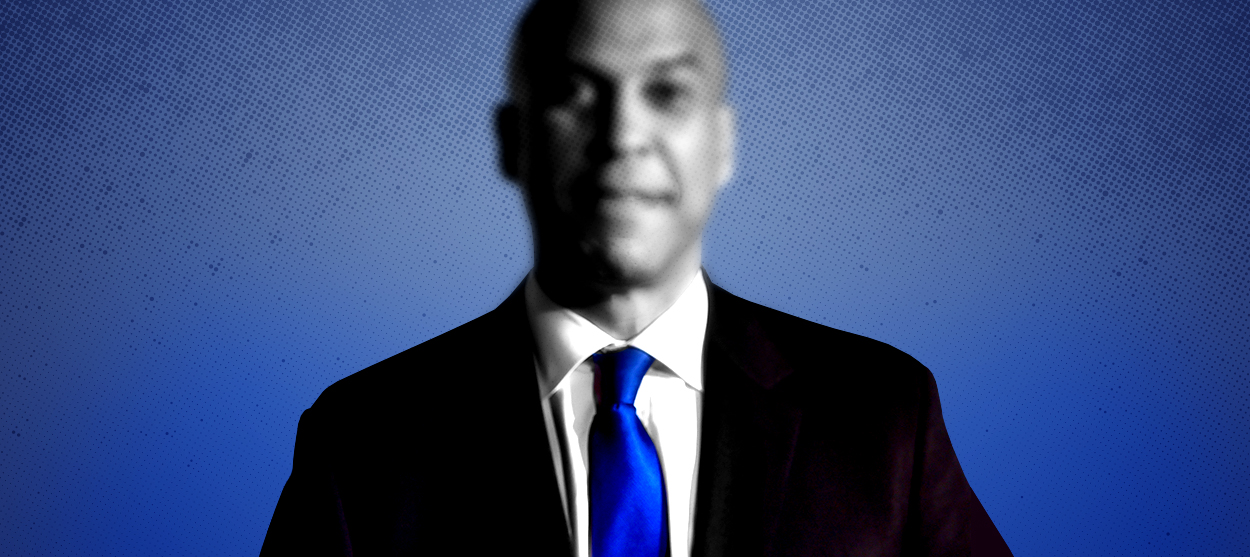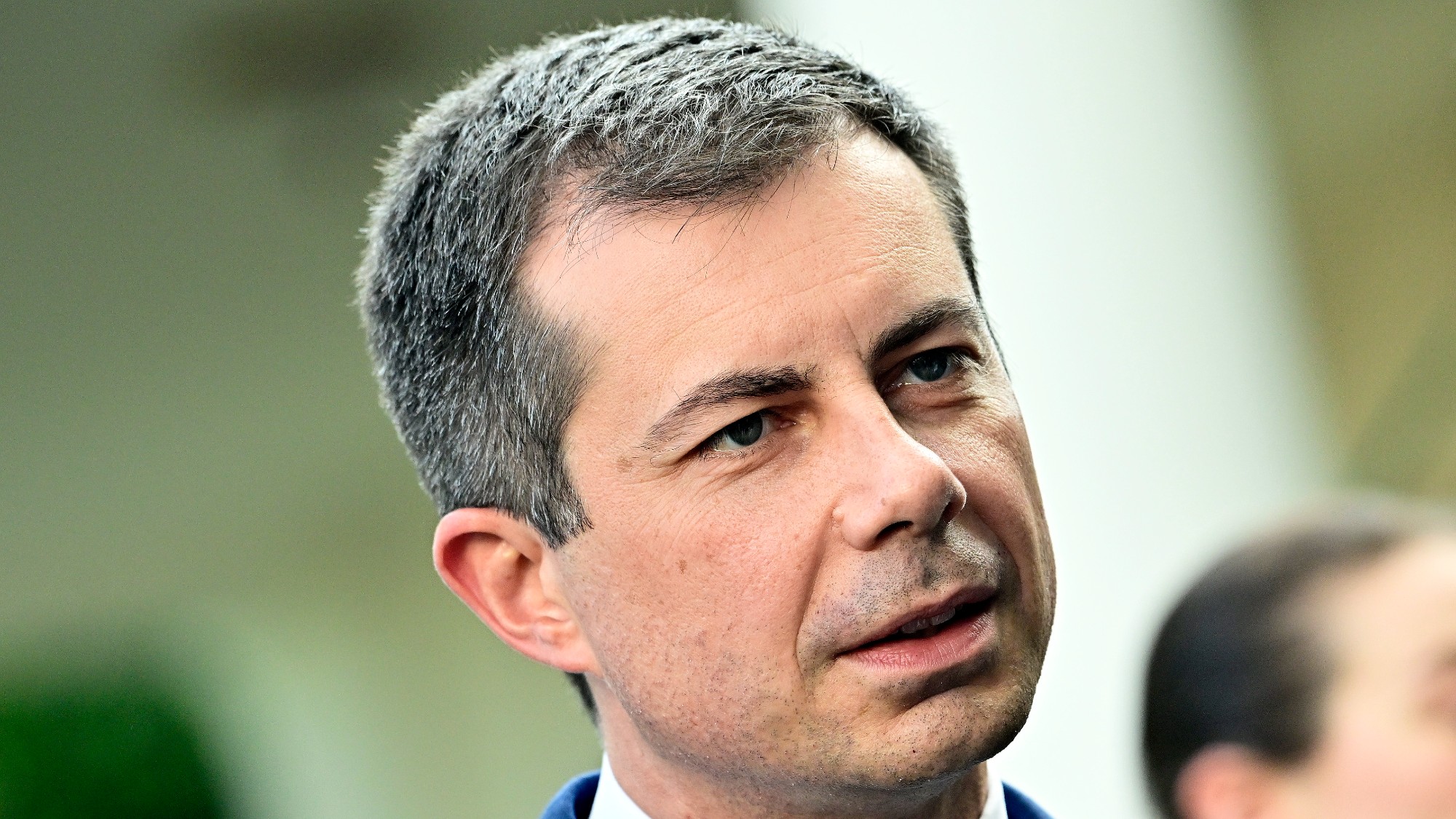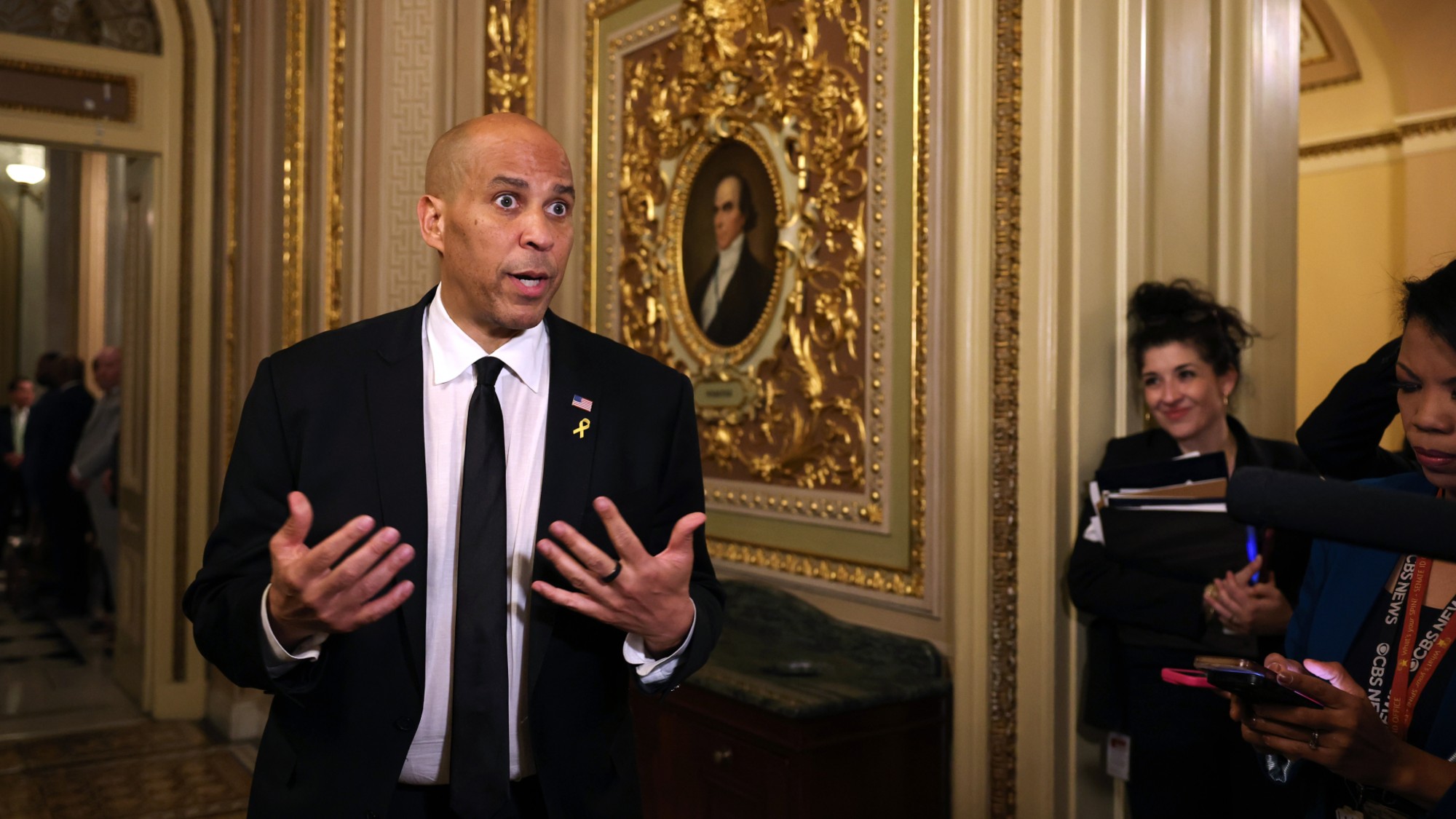The enigma of Cory Booker
He seemed like a perfect candidate for 2020. So why did his presidential campaign fail?


A free daily email with the biggest news stories of the day – and the best features from TheWeek.com
You are now subscribed
Your newsletter sign-up was successful
Few observers of the 2020 Democratic presidential campaign can have been surprised by Cory Booker's announcement on Monday that he was dropping out of the race. As a candidate he never rose above the low single digits in national polls and struggled with fundraising, despite several memorable debate performances and a résumé that would have appealed to a wide range of primary voters 10 or 20 years ago. Even now, there are no obvious reasons why he should have failed so spectacularly. Here is a popular second-term senator and former mayor, a vegan who remains a legend in New Jersey high-school football circles, a Rhodes scholar who lived for years in a housing project.
His career is stranger and more varied than that of most politicians. It is one defined by beating the odds. As a gadget player lining up on both sides of the ball in high school, he led Old Tappen, a three-touchdown underdog against Hoboken, to a historic upset victory thanks to plays like this long touchdown reception. In 1986 he was named to the USA Today All-USA team, where he appeared alongside Emmitt Smith. After that he was personally recruited by Gerald Ford for Michigan and Lou Holtz for Notre Dame before settling on Stanford, largely for academic reasons. Despite some impressive play-making (especially during another upset, of a number-one-ranked Notre Dame), he appears to have had priorities other than athletics and did not play up to his potential at tight end.
Instead, after earning a post-graduate degree at Oxford and a J.D. from Yale Law School, Booker returned to New Jersey, where he ran for city council. Here in 1998 he defeated a four-term incumbent thanks to his focus on crime. Among other things, he went on a 10-day hunger strike and set up residence in a tent in an attempt to bring attention to the problem of drug dealers operating in the open with impunity. Four years later he ran for mayor against Sharpe James, another long-tenured incumbent whose political career would end with a federal fraud conviction in 2008. Booker's bitter losing contest against James is chronicled in Street Fight, one of the best political documentaries ever made. Booker was simultaneously accused by his opponent of being a KKK operative, an agent of the Taliban, a closeted homosexual, a crypto-Republican, and someone who was "collaborating with the Jews to take over Newark." He was also called "not black enough" for the majority African-American city.
The Week
Escape your echo chamber. Get the facts behind the news, plus analysis from multiple perspectives.

Sign up for The Week's Free Newsletters
From our morning news briefing to a weekly Good News Newsletter, get the best of The Week delivered directly to your inbox.
From our morning news briefing to a weekly Good News Newsletter, get the best of The Week delivered directly to your inbox.
In 2006, James declined to run again (he was also in his seventh year as a state senator, an office he held simultaneously), and Booker was finally elected mayor. During his tenure, which would last until 2013, he did his best to uncover a series of land deals involving James and his associates that might have been taken straight out of The Sopranos, to lower crime (and especially murder) rates, and to reform the city's public schools. This involved a number of headline-grabbing moves, among them voluntarily cutting his own salary twice, living in an affordable housing complex, obtaining a $100 million donation to Newark Public Schools from Mark Zuckerberg, collaborating across partisan lines with Gov. Chris Christie and other Republicans, and communicating with constituents such as @BIG_BOOBS_CARLY via social media. He also saved a man from a burning building, rescued animals from freezing cold, and allowed citizens whose power was awaiting restoration to live with him.
It would be easy to dismiss one or two of these things as stunts, but taken together they suggest something far stranger: namely, that Booker is a very strange man who sincerely wishes to make peoples' lives better. Whether he succeeded in doing so — except obviously at the level of the numerous individuals whom he was able to assist — is very much an open question. Since being elected to the Senate in 2013, he has established himself as more of a conventional liberal politician, somewhere between the moderate Chuck Schumer and the left-wing Bernie Sanders wings of the Democratic Senate minority. He helped to lead the opposition to a number of President Trump's Cabinet nominees in 2017 (including that of his Senate colleague Jeff Sessions as attorney general); otherwise his career in national politics has been fairly unremarkable.
Why has Booker failed to make more of an impression on the American people? On paper he seems to be exactly what the Democratic base is looking for in 2020, a charismatic, well-spoken non-white man well below the age of 75 who is ideologically flexible and has an interesting life story. He ought to have been the perfect middle road between Joe Biden on the one hand and Bernie Sanders on the other, someone who could unite moderates and progressives across the party's various overlapping coalitions in the pursuit of common sense and decency. Instead he is dropping out before the very first vote is cast.
What can explain Booker's lack of success? Was he too earnest? It cannot have been that he was too deferential toward his opponents — his attacks on Biden were the most memorable of the debate cycle. Could it be that his earlier successes were bound up in the kind of grand gestures that get lost in a 24/7 internet-driven media cycle? Hardly. Booker was a pioneer in the art of using technology to further his political ambition. Nor, I think, can we blame an overly crowded 2020 race. Candidates like Jay Inslee and Michael Bennet had a difficult time distinguishing themselves from the rest of the field; Booker's departure leaves Andrew Yang, the maverick entrepreneur with no political experience, as the only non-white candidate now seeking the presidency. Instead Booker's early collapse seems inexplicable.
A free daily email with the biggest news stories of the day – and the best features from TheWeek.com
At the end of his presidential campaign — though not, of course, his political career — Booker remains what he has always been: an enigma.
Want more essential commentary and analysis like this delivered straight to your inbox? Sign up for The Week's "Today's best articles" newsletter here.
Matthew Walther is a national correspondent at The Week. His work has also appeared in First Things, The Spectator of London, The Catholic Herald, National Review, and other publications. He is currently writing a biography of the Rev. Montague Summers. He is also a Robert Novak Journalism Fellow.
-
 Switzerland could vote to cap its population
Switzerland could vote to cap its populationUnder the Radar Swiss People’s Party proposes referendum on radical anti-immigration measure to limit residents to 10 million
-
 Political cartoons for February 15
Political cartoons for February 15Cartoons Sunday's political cartoons include political ventriloquism, Europe in the middle, and more
-
 The broken water companies failing England and Wales
The broken water companies failing England and WalesExplainer With rising bills, deteriorating river health and a lack of investment, regulators face an uphill battle to stabilise the industry
-
 The billionaires’ wealth tax: a catastrophe for California?
The billionaires’ wealth tax: a catastrophe for California?Talking Point Peter Thiel and Larry Page preparing to change state residency
-
 Bari Weiss’ ‘60 Minutes’ scandal is about more than one report
Bari Weiss’ ‘60 Minutes’ scandal is about more than one reportIN THE SPOTLIGHT By blocking an approved segment on a controversial prison holding US deportees in El Salvador, the editor-in-chief of CBS News has become the main story
-
 Has Zohran Mamdani shown the Democrats how to win again?
Has Zohran Mamdani shown the Democrats how to win again?Today’s Big Question New York City mayoral election touted as victory for left-wing populists but moderate centrist wins elsewhere present more complex path for Democratic Party
-
 Millions turn out for anti-Trump ‘No Kings’ rallies
Millions turn out for anti-Trump ‘No Kings’ ralliesSpeed Read An estimated 7 million people participated, 2 million more than at the first ‘No Kings’ protest in June
-
 Ghislaine Maxwell: angling for a Trump pardon
Ghislaine Maxwell: angling for a Trump pardonTalking Point Convicted sex trafficker's testimony could shed new light on president's links to Jeffrey Epstein
-
 The last words and final moments of 40 presidents
The last words and final moments of 40 presidentsThe Explainer Some are eloquent quotes worthy of the holders of the highest office in the nation, and others... aren't
-
 13 potential 2028 presidential candidates for both major parties
13 potential 2028 presidential candidates for both major partiesIn Depth A rare open primary for both parties has a large number of people considering a run for president
-
 'In a fight, spectacle matters'
'In a fight, spectacle matters'Instant Opinion Opinion, comment and editorials of the day
